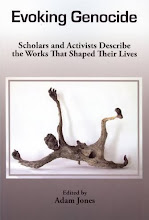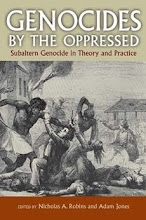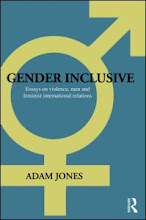In Guatemala, A Twist as Genocide Trial Nears End
By Daniel Hernandez
The Los Angeles Times, April 18, 2013
"On the first day of trial, a witness named Bernardo Bernal recounted how, as a 9-year-old in the spring of 1983, he hid in a stream and watched Guatemalan soldiers kill his parents and two younger brothers. On the second day of testimony in Guatemala City, a man named Pedro Chavez Brito described how soldiers found him and his siblings hiding in a traditional sauna in their village on Nov. 4, 1982. His sister was carrying a newborn. '"You are a guerrilla, you gave food to the guerrillas," they said to my sister,' the witness said, according to an unofficial transcript of the genocide case in Guatemala. Soldiers tied his sister to the stairs of the house and set fire to it, killing her, her children and perhaps six other relatives, Chavez Brito testified. Another witness said soldiers used an old woman's severed head as a soccer ball. The litany of terrors recalled in the genocide trial of former Guatemalan President Gen. Efrain Rios Montt has been relentless. The proceedings have been widely hailed by human rights groups as an important reckoning with the past, a rare prosecution of a former Latin American military dictator for war crimes in his own country. But on Thursday, nearly a month into the trial, the case suffered a potentially devastating setback. In a stunning turn, a judge from a different court granted an appeal from Rios Montt's defense to annul the entire case based on a technicality. That ruling in effect shut down the genocide trial and may force it to start all over. Prosecutors said they would appeal the decision. 'This is an absolute abuse of power, it is illegal, and of course we are going to appeal,' Arturo Aguilar, an aide to the attorney general, said shortly after the ruling. The uncertainty angered survivors, families and human rights advocates who had been attending day after day of wrenching testimony.
Witnesses, often through interpreters, have described how indigenous Maya women, children and elderly adults were raped, dismembered, burned and buried in mass graves during counterinsurgency operations that prosecutors say amounted to genocide. The case against the former Guatemalan president and his military intelligence chief, Jose Mauricio Rodriguez Sanchez, was not the first time that the world has heard about the atrocities committed by the country's army during the 36-year civil war that ended in 1996. They have been documented in international truth commission reports, books and films and in the stories that Guatemalans carry with them anywhere they live. But the trial has given survivors their first opportunity to testify in the same room as the high-ranking officers accused of ordering the burning of villages, the rapes and the executions of more than 1,770 Ixil Maya Indians in 1982 and 1983. This week, the prosecution finished making its case against Rios Montt, 86, and Rodriguez Sanchez. The defense, seemingly in disarray early in the proceedings, launched its campaign to have the case dismissed, or at least discredited in the public eye. On Tuesday, coalitions of Guatemalan army veterans, conservatives and Catholic groups placed ads or inserts in Guatemala City newspapers declaring that 'genocide never occurred' in the country and that prosecutors are undermining the 1996 peace accords between the military and Marxist guerrillas. In all, about 200,000 people, mostly civilians, were killed during decades of fighting that started in 1960 after a US-backed military coup, the United Nations has found. 'There is still little consensus in Guatemala over what happened during the armed conflict or why,' Mary Speck, a Guatemala-based analyst for the International Crisis Group, said by email. 'These attacks on prosecutors -- including Atty. Gen. Claudia Paz y Paz -- as well as on human rights groups and their international supporters are likely to increase,' she said. If the trial resumes and a verdict is handed down by a special three-judge panel, it could have far-reaching implications for high-ranking army veterans and other members of Guatemala's right-wing elite. During testimony April 4, an ex-soldier testified via videoconference from an undisclosed location that an army officer named Otto Perez Molina -- now Guatemala's president -- directly ordered the executions of villagers in 1982. The implication reportedly rocked the courtroom, producing gasps among witnesses and observers. Perez Molina later labeled the soldier's testimony as 'falsehoods,' but the implication raised a troubling question. Could Perez Molina, a retired general protected by immunity as Rios Montt was by virtue of holding a public office, be next in the defendant's chair? The Rios Montt trial 'is going to open doors for prosecutions against other military murderers,' said Guatemalan American journalist Francisco Goldman, author of a book about the 1998 killing of Bishop Juan Gerardi. 'It's also a way to clean up the murk of all these sorts of hidden powers rooted in military intelligence. And not just in Guatemala.'"
[n.b. This is the complete text of the dispatch.]
By Daniel Hernandez
The Los Angeles Times, April 18, 2013
"On the first day of trial, a witness named Bernardo Bernal recounted how, as a 9-year-old in the spring of 1983, he hid in a stream and watched Guatemalan soldiers kill his parents and two younger brothers. On the second day of testimony in Guatemala City, a man named Pedro Chavez Brito described how soldiers found him and his siblings hiding in a traditional sauna in their village on Nov. 4, 1982. His sister was carrying a newborn. '"You are a guerrilla, you gave food to the guerrillas," they said to my sister,' the witness said, according to an unofficial transcript of the genocide case in Guatemala. Soldiers tied his sister to the stairs of the house and set fire to it, killing her, her children and perhaps six other relatives, Chavez Brito testified. Another witness said soldiers used an old woman's severed head as a soccer ball. The litany of terrors recalled in the genocide trial of former Guatemalan President Gen. Efrain Rios Montt has been relentless. The proceedings have been widely hailed by human rights groups as an important reckoning with the past, a rare prosecution of a former Latin American military dictator for war crimes in his own country. But on Thursday, nearly a month into the trial, the case suffered a potentially devastating setback. In a stunning turn, a judge from a different court granted an appeal from Rios Montt's defense to annul the entire case based on a technicality. That ruling in effect shut down the genocide trial and may force it to start all over. Prosecutors said they would appeal the decision. 'This is an absolute abuse of power, it is illegal, and of course we are going to appeal,' Arturo Aguilar, an aide to the attorney general, said shortly after the ruling. The uncertainty angered survivors, families and human rights advocates who had been attending day after day of wrenching testimony.
Witnesses, often through interpreters, have described how indigenous Maya women, children and elderly adults were raped, dismembered, burned and buried in mass graves during counterinsurgency operations that prosecutors say amounted to genocide. The case against the former Guatemalan president and his military intelligence chief, Jose Mauricio Rodriguez Sanchez, was not the first time that the world has heard about the atrocities committed by the country's army during the 36-year civil war that ended in 1996. They have been documented in international truth commission reports, books and films and in the stories that Guatemalans carry with them anywhere they live. But the trial has given survivors their first opportunity to testify in the same room as the high-ranking officers accused of ordering the burning of villages, the rapes and the executions of more than 1,770 Ixil Maya Indians in 1982 and 1983. This week, the prosecution finished making its case against Rios Montt, 86, and Rodriguez Sanchez. The defense, seemingly in disarray early in the proceedings, launched its campaign to have the case dismissed, or at least discredited in the public eye. On Tuesday, coalitions of Guatemalan army veterans, conservatives and Catholic groups placed ads or inserts in Guatemala City newspapers declaring that 'genocide never occurred' in the country and that prosecutors are undermining the 1996 peace accords between the military and Marxist guerrillas. In all, about 200,000 people, mostly civilians, were killed during decades of fighting that started in 1960 after a US-backed military coup, the United Nations has found. 'There is still little consensus in Guatemala over what happened during the armed conflict or why,' Mary Speck, a Guatemala-based analyst for the International Crisis Group, said by email. 'These attacks on prosecutors -- including Atty. Gen. Claudia Paz y Paz -- as well as on human rights groups and their international supporters are likely to increase,' she said. If the trial resumes and a verdict is handed down by a special three-judge panel, it could have far-reaching implications for high-ranking army veterans and other members of Guatemala's right-wing elite. During testimony April 4, an ex-soldier testified via videoconference from an undisclosed location that an army officer named Otto Perez Molina -- now Guatemala's president -- directly ordered the executions of villagers in 1982. The implication reportedly rocked the courtroom, producing gasps among witnesses and observers. Perez Molina later labeled the soldier's testimony as 'falsehoods,' but the implication raised a troubling question. Could Perez Molina, a retired general protected by immunity as Rios Montt was by virtue of holding a public office, be next in the defendant's chair? The Rios Montt trial 'is going to open doors for prosecutions against other military murderers,' said Guatemalan American journalist Francisco Goldman, author of a book about the 1998 killing of Bishop Juan Gerardi. 'It's also a way to clean up the murk of all these sorts of hidden powers rooted in military intelligence. And not just in Guatemala.'"
[n.b. This is the complete text of the dispatch.]














No comments:
Post a Comment
Please be constructive in your comments. - AJ